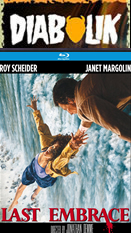
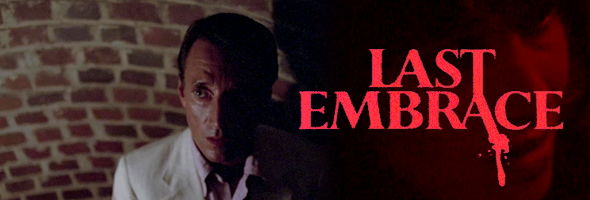
Color, 1979, 102m.
Directed by Jonathan Demme
Starring Roy Scheider, Janet Margolin, John Glover, Sam Levene, Charles Napier, Christopher Walken
Signal One (Blu-ray & DVD) (UK RB/R2 HD/PAL), Kino Lorber (Blu-ray & DVD) (US RA/R1 HD/NTSC) / WS (1.85:1) (16:9), Paradiso (Holland R2 PAL), OFDb Filmworks (Germany R2 PAL), Atlantic (Sweden R2 PAL) / WS (1.85:1)
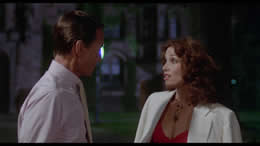
Thanks to the eruption of the auteur theory and the groundbreaking published interviews between Alfred Hitchcock and 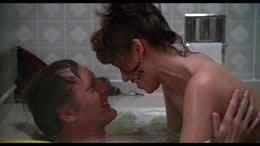 François Truffaut, it seemed like almost every New Hollywood filmmaker of the '70s had to have a crack at paying homage to the Master of Suspense. At the top of the heap was Brian De Palma, of course, though one could easily argue that he was adopting and transforming the Hitchcock technique rather than copying it. (However, that's a whole different discussion.) Weirdly enough, Roy Scheider headlined two of the more memorable Hitchcock love fests: Robert Benton's subdued but eerie Still of the Night in 1982, and the eccentric Last Embrace, helmed by Roger Corman alumnus Jonathan Demme in between his more typical warm character studies, Citizen's Band and Melvin and Howard.
François Truffaut, it seemed like almost every New Hollywood filmmaker of the '70s had to have a crack at paying homage to the Master of Suspense. At the top of the heap was Brian De Palma, of course, though one could easily argue that he was adopting and transforming the Hitchcock technique rather than copying it. (However, that's a whole different discussion.) Weirdly enough, Roy Scheider headlined two of the more memorable Hitchcock love fests: Robert Benton's subdued but eerie Still of the Night in 1982, and the eccentric Last Embrace, helmed by Roger Corman alumnus Jonathan Demme in between his more typical warm character studies, Citizen's Band and Melvin and Howard.
After his wife is killed during a work-related shoot out in Mexico, federal agent Harry Hannan (Scheider) is sent to a psychiatric institution for several months. Upon his release, Harry is confronted with a bewildering string of developments including cryptic blank messages from his employer, a pretty 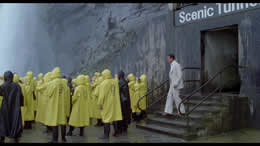 college student named Ellie (Margolin) subletting his apartment without his knowledge, odd Hebrew notes shoved under the door by a murderer known as the Avenger of Blood, and random attempts on his own life. Seemingly under surveillance everywhere he goes, Harry enlists Ellie to help him unravel the mystery, which leads to a big climax at Niagara Falls.
college student named Ellie (Margolin) subletting his apartment without his knowledge, odd Hebrew notes shoved under the door by a murderer known as the Avenger of Blood, and random attempts on his own life. Seemingly under surveillance everywhere he goes, Harry enlists Ellie to help him unravel the mystery, which leads to a big climax at Niagara Falls.
The obvious reference point here is mainly Vertigo what with its opening fatal trauma, bell tower showdown, and slippery identity-shifting characters, but Demme manages to give the film his own quirky spin at times thanks to a gallery of colorful character actors including Christopher Walken (memorable as one of Scheider's colleagues), John Glover (as an unsettling expert in Hebrew texts), drive-in great Charles Napier, and even an early small role for Broadway legend and Homeland star Mandy Patinkin. As was common for the period, 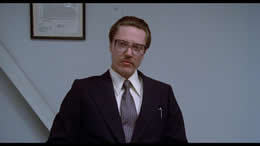 there's an attempt to meld the structure and tone of classic Hollywood (complete with a thunderous score by Miklós Rózsa) with the loosened censorship of the MPAA; nowhere is this better executed than the bathtub scene in the third act, the most memorable and startling twist in the entire film. Scheider does a fine job of anchoring the film (basically a continuation of his role in '77's Sorcerer), but in many respects this is a showcase for Margolin, a fascinating actress who made a splash with David and Lisa in 1962 but had a very uneven career after that until her untimely death in 1993. She's really great here with a role that seems like a thankless good girl part at first but evolves into a complicated, highly unusual character not quite like any other.
there's an attempt to meld the structure and tone of classic Hollywood (complete with a thunderous score by Miklós Rózsa) with the loosened censorship of the MPAA; nowhere is this better executed than the bathtub scene in the third act, the most memorable and startling twist in the entire film. Scheider does a fine job of anchoring the film (basically a continuation of his role in '77's Sorcerer), but in many respects this is a showcase for Margolin, a fascinating actress who made a splash with David and Lisa in 1962 but had a very uneven career after that until her untimely death in 1993. She's really great here with a role that seems like a thankless good girl part at first but evolves into a complicated, highly unusual character not quite like any other. 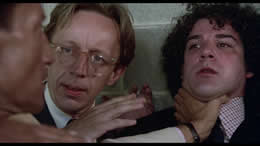
Last Embrace was given a modest theatrical release from United Artists complete with memorable poster art that inexplicably depicts the very last moments of the film, an odd marketing decision that would never fly today. It became a pay TV staple throughout the early '80s and appeared on VHS from Key Video (a subsidiary of Fox when it had the MGM/UA library), with a laserdisc appearing later from Image Entertainment complete with an isolated score track. For some reason it only appeared on DVD in Europe (mostly in flat letterboxed transfers similar to the laserdisc) for much of the format's history, only making it to American home video again in 2014 courtesy of Kino Lorber on Blu-ray and DVD. The HD transfer looks great, not surprisingly, with a clear but accurate rendition of how a film shot on late '70s film stock should look. It's a major improvement over the older discs and should make fans very happy. The DTS-HD mono track sounds fine and does a good job with the often overpowering score. Extras include the theatrical trailer and a 10-minute interview with producer Michael Taylor, who's proud of the final result and talks a bit about the cast and marketing campaign.
The following year, the UK got its own special edition of the film from Signal One, with a very similar transfer from what appears to be the same HD source at MGM. As with the other overlapping US/UK titles, the black levels are a notch deeper and the bit rate is consistently a bit higher throughout, resulting in a slightly more textured image. The trailer is carried over here, and instead of the featurette you get a new exclusive commentary by film writer David Thompson. Extremely well versed in Demme's cinema, he goes a thorough job of pointing out the various cultural and artistic references in the film (especially its touchy handling of Jewish American culture) and notes the frequent Demme trademarks that pop up throughout, such as actors seeming to address the camera to create a jarring, intimate effect. It's a great, well-researched survey of the film and should be enough to not only make this recommended for Region B fans but a likely double dip candidate for Region A-ers as well.
Updated review on October 23, 2015.







